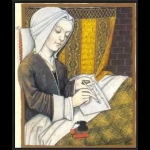: Speak to me. Take my hand. What are you now?
I will tell you all. I will conceal nothing.
When I was three, a little child read a story about a rabbit
who died, in the story, and I crawled under a chair :
a pink rabbit : it was my birthday, and a candle
burnt a sore spot on my finger, and I was told to be happy.
: Oh, grow to know me. I am not happy. I will be open:
like glad horns blowing, and birds tilting, and an arm about me.
There was one I loved, who wanted to live, sailing.
: Speak to me. Take my hand. What are you now?
When I was nine, I was fruitily sentimental,
fluid : and my widowed aunt played Chopin,
and I bent my head on the painted woodwork, and wept.
I want now to be close to you. I would
link the minutes of my days close, somehow, to your days.
: I am not happy. I will be open.
I have liked lamps in evening corners, and quiet poems.
On what a tragedy his life was, really.
: Take my hand. Fist my mind in your hand. What are you now?
When I was fourteen, I had dreams of suicide,
and I stood at a steep window, at sunset, hoping toward death :
if the light had not melted clouds and plains to beauty,
if light had not transformed that day, I would have leapt.
I am unhappy. I am lonely. Speak to me.
: I will be open. I think he never loved me:
He loved the bright beaches, the little lips of foam
that ride small waves, he loved the veer of gulls:
he said with a gay mouth: I love you. Grow to know me.
: What are you now? If we could touch one another,
if these our separate entities could come to grips,
clenched like a Chinese puzzle . . . yesterday
I stood in a crowded street that was live with people,
and no one spoke a word, and the morning shone.
Everyone silent, moving. . . . Take my hand. Speak to me.




















Comment form: